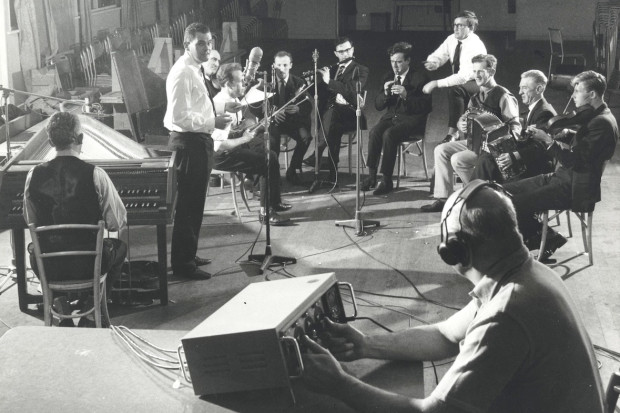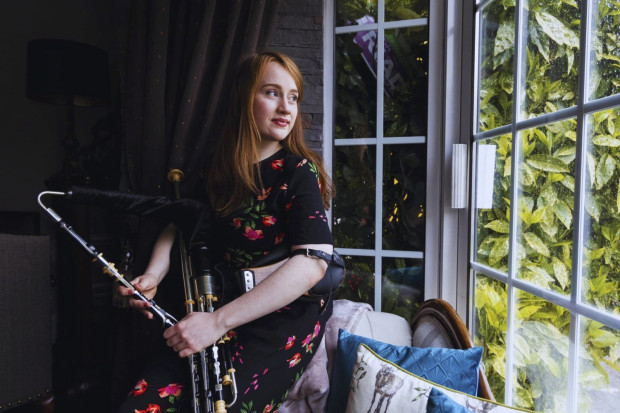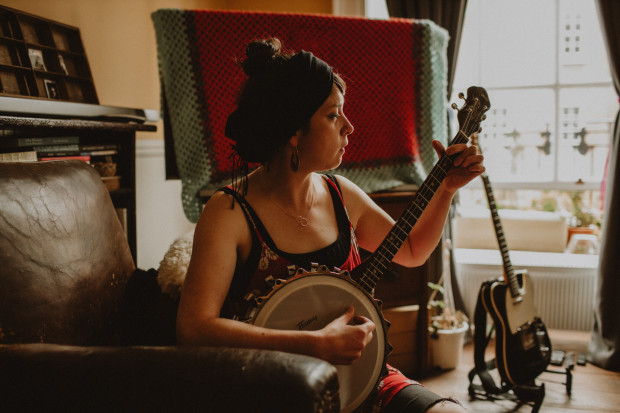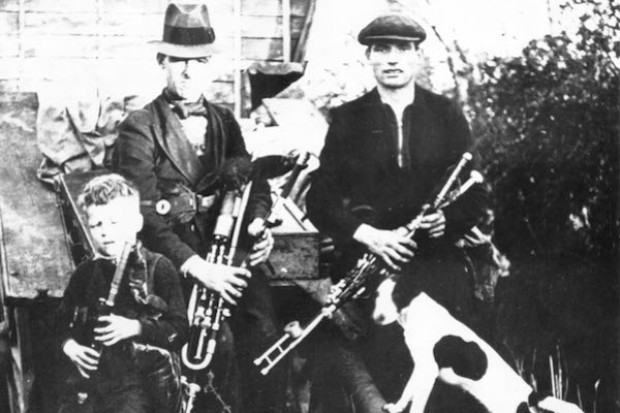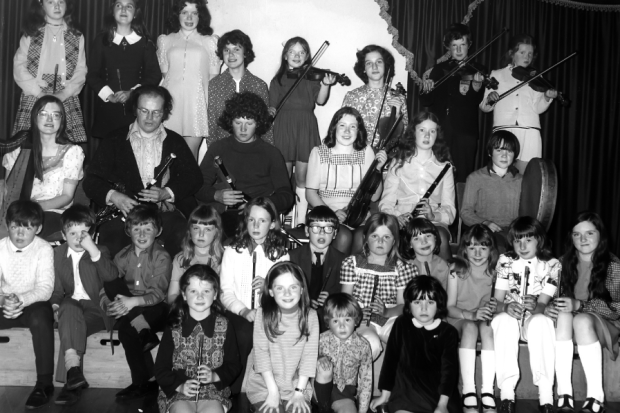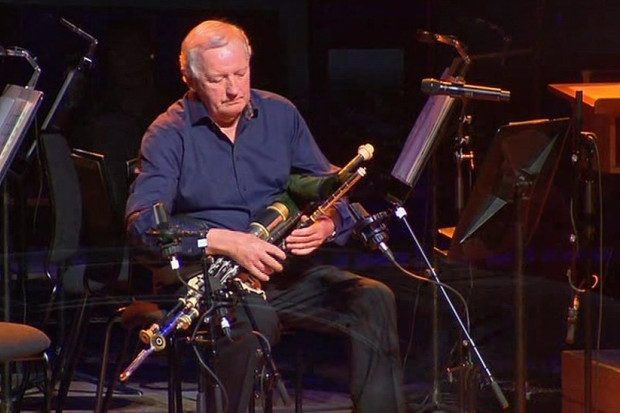The Piper's Dream
Glasgow is home to one of Scotland’s finest exponents of the uilleann pipes, Pat McNulty. He has a long history in Irish culture in Scotland. For instance, in 1957 he helped establish Glasgow’s first Comhaltas branch, the first-ever Comhaltas outside Ireland. He’s been rather out of the Irish music scene in recent years, but now is getting back into it – albeit that he’s not too keen on what he finds in it as far as his beloved instrument is concerned …
He was born in the city, his family being from near Castleblaney, Monaghan. His father ‘played pipes a bit’, he says, but his grandfather was ‘a genuinely great piper’. His mother was a well-known singer, who played melodeon too.
Despite that background, his childhood didn’t coincide with an ideal time for learning Irish music in Glasgow. It wasn’t even that ideal a time in Ireland, despite the efforts of Breathnach, Ó Riada and others. Ireland’s traditional music was at a low ebb. For a keen youngster, there were no classes. Nor instruments; one of his early experiences was the depressing spectacle of his grandfather’s old pipes, then hopelessly beyond playing.
Not that his music started with the pipes. He actually started on fiddle, partly teaching himself, and could soon accompany stepdancing. But he eventually tired of that. ‘Unrewarding,’ he explains succinctly. Besides, he’d become hooked on the pipes. He’d heard them on record and was determined that one day he would play them himself. Learning that there was an old man in Glasgow – Willie Hamilton – who actually made pipes, Pat located him and bought a practice set, half a tone below concert. Laboriously listening and re-listening to old Rowsome 78s, he taught himself the instrument: there was no other way. This was 1957. One year later, he won the All-Ireland, going on to win five more All-Irelands, plus prizes at Oireachtas na Gaeilge.
He didn’t just play pipes, though. He formed a céilí band (playing piano himself) and that won the All-Ireland also. He took up whistle, and began to collect pipe tunes, publishing his Collection Of The Dance Music Of Ireland (reprinted five times). Piping audiences grew, and he bought concert-pitch pipes from Kennedy of Cork, powerful enough for bigger venues. He also inherited a c. 1840s C set of Egan pipes. He published poems, he recorded and performed in Ireland (including on RTÉ) and played and broadcast in Germany and the USA. He performed in John Tavener’s Celtic Requiem in 1969, becoming the first uilleann piper to play in a concert orchestra. He held masterclasses, composed (his tunebook The Piper’s Dream came out in 1990), and released two LPs. Employing his scientific skills (he was a professional research scientist), he studied the pipes’ acoustics, and used the data to design and build improved instruments.
Despite all the above, he’s hardly well-known now. There are reasons for this. One is that he’s something of a purist. He worries that Scotland’s folk scene, which once would have welcomed solo performers, is less keen on them. (There’s something in this, except that many club organisers would happily put on solo traditional instrumentalists – if they thought there would be the audiences). He is a passionate advocate of the uilleann pipes as a solo instrument (or perhaps with other pipes). He believes in the solo player or singer in Irish music generally. Unfortunately for him, this is a world of big line-ups and notions like ‘Celtic fusion’. (‘Whatever does that mean?’ he complains, ‘music’s either Irish or Scottish, not both’). It is a world, also, in which improbable instrumental blends are attempted, ‘World Music’ at its worst. A lone individual on a stage doing something straightforward is increasingly a rare sight. And he wishes it wasn’t.
‘I’m very critical of the media for all this. For a start, I’m shocked by how little traditional music RTÉ does now. Obviously, we can’t get Irish TV, but I gather RTÉ’s traditional output is very low. Is there a policy favouring bands over soloists? Would even Willie Clancy get a hearing today, say? But it’s not just about RTÉ. It’s commercial pressure. I think the public are getting false ideas about Irish music. What they get is glamorous, but to me, it doesn’t work. It’s a much degraded version of the national music. It’s all led by media people who don’t know (or care) about our music. Musicians who should know better collude with this. One sign of it is pipers playing hell for leather because the media wants “fast”. Alright, the stuff can briefly seem clever, but in the long run it’s not Irish music. I’d argue that nowadays almost no pipers – except people like Paddy Keenan – are using the instrument to its full potential. Even soloists. And of course, it’s pointless using the regulators in a band, they won’t be heard anyway. Pipes are only heard to true advantage as solo instruments. Also, the fact is, melody instruments like pipes simply don’t go with harmonic instruments like bouzoukis. They simply don’t’.
He has always campaigned for the pipes. He helped found Na Píobairí Uilleann in 1968 (‘I’m proud that masters like Ennis and Rowsome considered me a colleague, young as I was then’) and in the 80s, The Society Of Union Pipers in Britain. ‘I hoped that Na Píobairí would protect and promote the music. But I don’t think they have. Nor has Comhaltas. In fairness, it’s been two pretty small organisations versus big money … Anyway, although Ireland is full of pipers now (and there are uilleann pipers here too), I’ve found that many understand only band playing. They’ve wanted tuition from me, but how can I teach them? They haven’t the musical language nor the repertoire. Few have even heard of Clancy, Doran, Ennis and Rowsome’.
Some of the views he holds don’t readily get him invited to perform on concert stages, although he was pleased to play Sidmouth Folk Festival this year. (‘They have real traditional music there,’ he says). He’s nevertheless been beavering away in the background on various piping projects. He released a video in 1996, The Singing Chanter, showing the full concert instrument at work and another in 2002 of himself and his wife Ann performing together. He’s currently doing a CD and is starting on what he hopes will be the definitive book on the uilleann pipes, from history to construction, from playing techniques to routine maintenance, all within a scholarly, musical and scientific context.
He’s hopeful for the pipes, although he thinks the forces ranged against the pure instrument are huge. ‘The pipes have been around for centuries,’ he reflects, ‘seeing good times and bad. Currently, I think they’re being taken in the wrong direction. I want them going in the right one, that’s all.’
Published on 1 November 2002
Steve McGrail was a singer, musician and writer from Scotland. He wrote several articles for The Journal of Music and was a great supporter of the magazine from its very first issue. Steve sadly died on 11 May 2016, aged 69.












